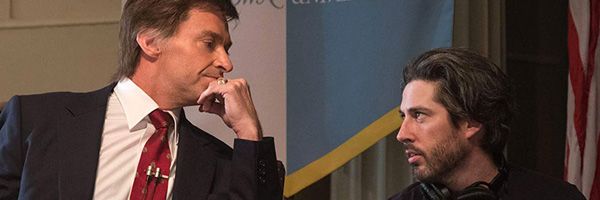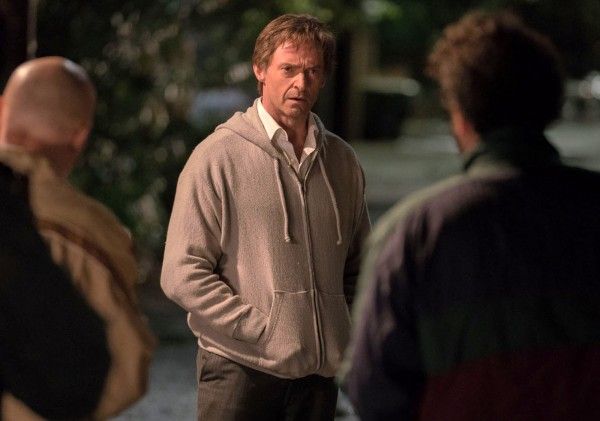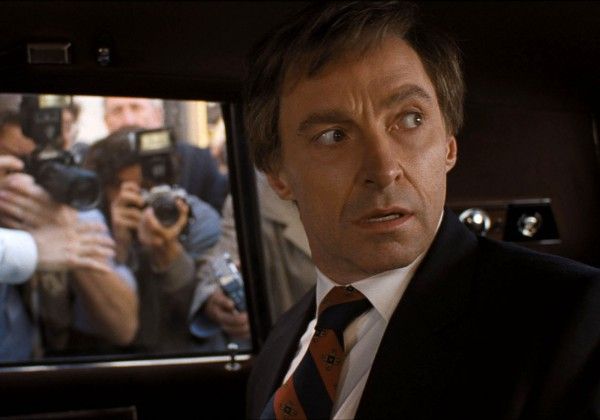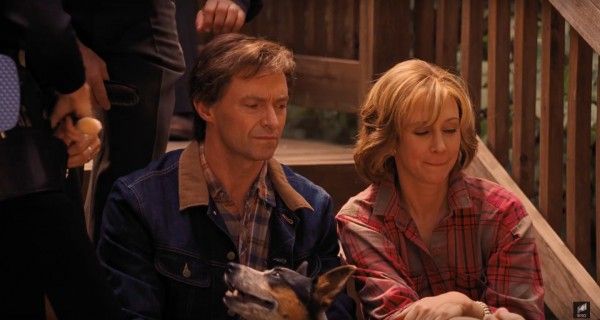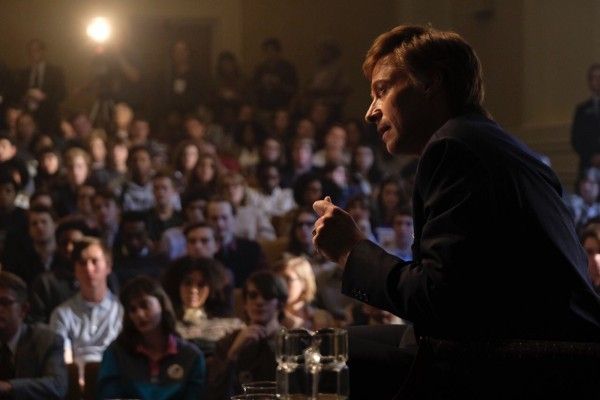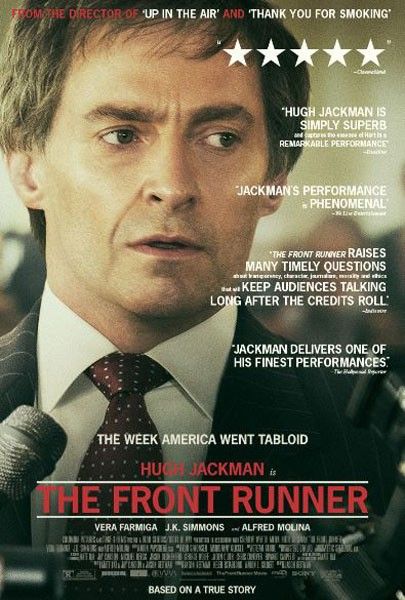From director Jason Reitman and based on the book All the Truth is Out by Matt Bai, the real-life story of The Front Runner follows the rise and fall of politician Gary Hart (Hugh Jackman), the charismatic senator who was considered the front runner for the 1988 Democratic presidential nomination, until his campaign was derailed by the story of an extramarital relationship with Donna Rice (Sara Paxton). As tabloid journalism found its voice in politics, no amount of smarts, idealism and excitement could keep Hart’s race going, and the questions surrounding his personal life affected all of those around him. The film also stars Vera Farmiga, J.K. Simmons, Alfred Molina, Kevin Pollak, Ari Graynor, Molly Ephraim, Tommy Dewey and Steve Zissis, among others.
During this 1-on-1 phone interview with Collider, filmmaker Jason Reitman talked about why he was attracted to the story of Gary Hart, wanting to use the vintage Columbia logo for the film, the importance of humanizing Donna Rice, the challenge of making Tully and The Front Runner back to back, whether he’ll work with Diablo Cody again, how J.K. Simmons has become his acting muse, the extensive research that Hugh Jackman did to play Gary Hart, and screening the film for the real-life subjects.
Collider: The first thing that struck me when I saw the movie was the use of the vintage Columbia logo. What made you decide to use that?
JASON REITMAN: There were a variety of reasons. I grew up with that logo. It was on my father’s films, and I dreamt of always having the Columbia logo on my film. So, when Sony picked up the film, the first thing that I asked for was to use the vintage Columbia lady. And specifically, we got it off of a print of Stripes, so there’s this lovely connective tissue that my father’s film, which is a film that I’ve seen a billion times, now has a small part in The Front Runner.
That’s awesome! You’ve said that you first heard about this story when author/screenwriter Matt Bai appeared on the Radio Lab podcast. How did you end up listening to that podcast, and what was it about the story that caught your attention?
REITMAN: Honestly, it just felt like a movie. Here was a story that I didn’t know very well, about a moment in our recent history when the presumed next President of the United States was in an alleyway, in the middle of the night, with three reporters behind his townhouse, and no one knew what to do because no one had ever been there before. That just felt like a movie. It felt like a thriller. And the more that I learned about it, the more it felt as though it had all of this connective tissue with 2018, and questions that I feel like I’m asking and everyone I know is asking about this moment.
It’s really interesting to watch this story through that lens. It makes you wonder what you might have thought about all of this, if we weren’t living in the insanity that we’re living in now.
REITMAN: That’s the interesting thing about this story. It plays with our memory. When I would tell people, “I’m making a movie about the Gary Hart scandal,” people would generally say, “Oh, that boat, Monkey Business? And what was that blonde’s name? Donna Rice.” And their perception of it was cold. They really treated Donna Rice like an object, and they treated the whole story like a joke. This was a moment where, the more I learned about it, I realized that a young woman really just lost her life. It was just ripped out of her hands, in a way that just is completely heartbreaking. And we, as an electorate, decided to toss away this candidate. Now, maybe Gary Hart would’ve been a great president, or maybe not., but we just threw him aside and turned him into a national joke, in one week, and went on to misremember the fact that this was a guy with big ideas. We are currently exploring the concept of what flaws we are willing to put up with in our president, or a Supreme Court justice, or whatever.
I really appreciated how much care you took with the way that Donna was represented in this film. Her life was completely upended, and she’s very humanized in the story. When it came to her, what were the things that were most important to you to portray, and what did you think Sara Paxton had that embodied what you were looking for?
REITMAN: We wanted to do something, very specifically, in the construction of the movie. I think most people are gonna go into the movie thinking that they’re coming to see salacious, and they’re gonna realize that’s not what we’re doing. When we get to the scene on the boat, you barely see anything. We’re playing with the perception of who Donna Rice is. In the first half of the film, I know what the audience thinks. And then, you finally get to meet her, but once you meet her, she’s a human being who has been broken, and that’s the first time you have to reckon with her. There’s something jarring, having had this presumption about a character, and then realizing, “Wait, she’s a human being who aspired to a lot and really worked hard, and now all of that has been taken away from her.” And Sara, in particular, had the best read on that part of Donna’s life. I had an audition with Sara and I remember saying to her, “Think about the worst thing on your phone right now, and imagine if it got broadcast to the world.” I saw something flash through her eyes, and she did the scene and just cried, and it was just heartbreaking. That’s how I knew we had our Donna.
There is something so heartbreaking about watching this woman, who is smart and had these goals for herself, and then, in an instant, have her life be defined by a man.
REITMAN: Her life was defined unfairly by a moment. Her life ended up getting defined, by all of us – anyone who’s ever just thought of her, in passing, as this girl on a boat, instead of a real human being. That was the purpose of the scenes with Molly Ephraim and Sara Paxton. You had this young woman on the campaign, Irene Kelly, with Donna, and it’s like facing a mirror. You have two young women trying to understand their destinies and their aspirations, and they’re a reflection of each other, as they simultaneously realize that what they each aspire to is never gonna be the same.
Before ultimately making this movie, were there other movies, along the way, that you got close to making, prior to this one going into production?
REITMAN: What was wild was just making Tully and The Front Runner back to back. There was a moment when both films were in the AVID, at the same time. It was complicated making this really intimate movie about post-partum depression, done in this tonal style that Diablo [Cody] and I make movies in, and then switching to this lively 20-person ensemble period piece that’s supposed to be hyper-real, and follow journalists and campaign workers, as they investigate a scandal.
What’s the status of you working with Diablo Cody again? Have you spoken about the possibility of doing any more projects together?
REITMAN: I think that’s an inevitably. We both know that that’s a lifelong partnership. We’re gonna keep on making stuff. If I had to make a list of people I am most confident I will work with again, Diablo and J.K. Simmons are at the top of the list, followed by Charlize [Theron] and Hugh Jackman.
What makes you keep turning to J.K. Simmons, as your acting muse?
REITMAN: I can only imagine the look of ridicule on his face, when he hears that he is my muse. He’s just a brilliant fucking actor, and I’m the lucky guy who gets to work with him. Personally, I think in J.K.’s voice. I think I could probably give you his reaction to most things. In many ways, I think it’s his point of the view of the world that I really aspire to.
Because you have such a terrific cast of actors in this and most of them are quite familiar faces, was there any one actor that you didn’t think to cast, but are glad someone brought them to your attention?
REITMAN: Mamoudou Athie, who played AJ Parker, is an actor that I was unfamiliar with when I started this process, and I’m very grateful that I became aware of him. He’s such a talent, and was such an unusual and interesting voice within the ensemble. Honestly, the joy of doing a 20-person ensemble is that I got to work with all these actors that I’ve wanted to work with for awhile and who were lifelong dreams, like working with Alfred Molina and Kevin Pollak. And then, I also got to work with comedians that I love, like Bill Burr, and young actors, who I knew and wanted to work with, like Molly Ephraim. This was a cool opportunity, across the board, to check a lot of boxes.
And then, you throw Hugh Jackman into the middle of it, who can charm anyone. So, why was he your Gary Hart, and how did you approach how much you wanted to transform him for the film?
REITMAN: I wanted to work with Hugh for a variety of reasons. He’s just the ultimate movie star, he’s incredibly decent, and he’s so hard working. I was excited, specifically, by the challenge of Hugh getting out of his skin. We think of him as this actor whose heart just beats out of his chest. He’s a very emotionally expressive actor. So, the idea of him playing this enigma, who’s a guy that we desperately want to know and who’s bringing us right to the edge but won’t let us in, really interested me. What was thrilling was to watch him go on this deep dive, with the amount of research he did. He had notebooks and notebooks of research, to a point where other departments were going to Hugh for information about Gary Hart and getting video clips for the edit. Matt Bai thinks that Hugh probably found out more information on Gary Hart than he did, even while writing the book. He knew speeches that weren’t in the film and he knew talking points that weren’t in the film. He could really go off-the-cuff, at any moment.
You screened this film for Gary Hart, the campaign team, and Donna Rice. What was it like to make this movie and put your heart and soul into it, and then screen it for the actual people that it’s about?
REITMAN: I have so much empathy for Donna and for the Harts, and I wanted to treat them with decency while telling an honest story. I was scared to show them, but their response was remarkably open and lovely. The funniest thing is that, after they watched the film, everyone said the same thing. They just were so impressed with how good an actor Hugh Jackman is. I showed them the film and, of course, I was thinking, “This will be a heart-wrenching experience of reliving a life,” but they were watching a movie and thinking, “Hugh Jackman can really act!” I would imagine that it’s very complicated [to watch this time in their life], but we all wanted to take a humanistic approach to the characters. I think there’s a certain sense of gratitude that, after 30 years of their story only being told as a salacious joke, we told a very humanist, empathetic version of 1987.
The stories you tell are so different and so compelling. Where will you go from here? Do you know?
REITMAN: God, I just released two movies in six months (Tully and The Front Runner)! I am absolutely in love with movies, and I’m so grateful that I get to make them. Believe you me, if I can be on set next year, I will be.
The Front Runner opens nationwide on November 21st.

